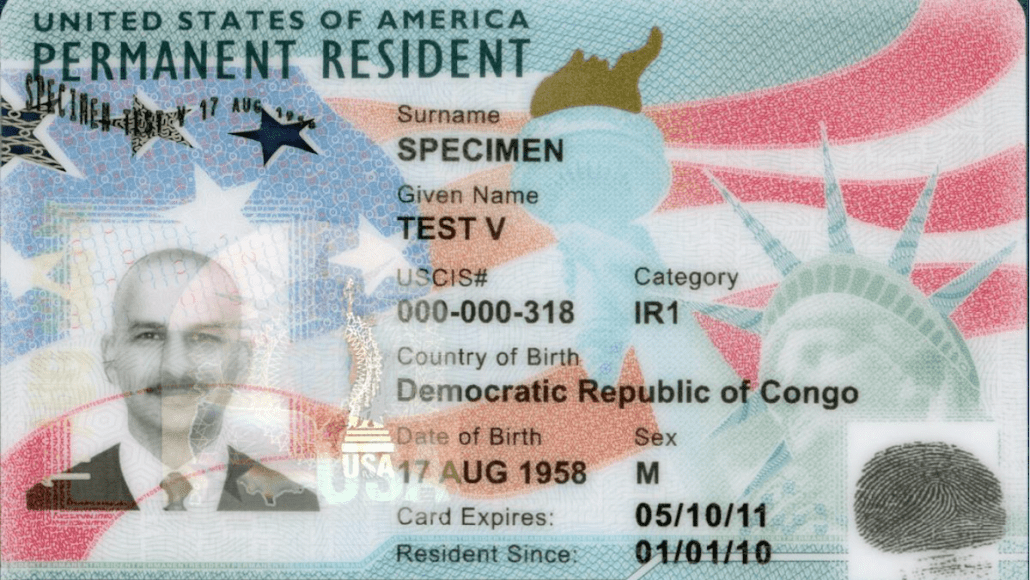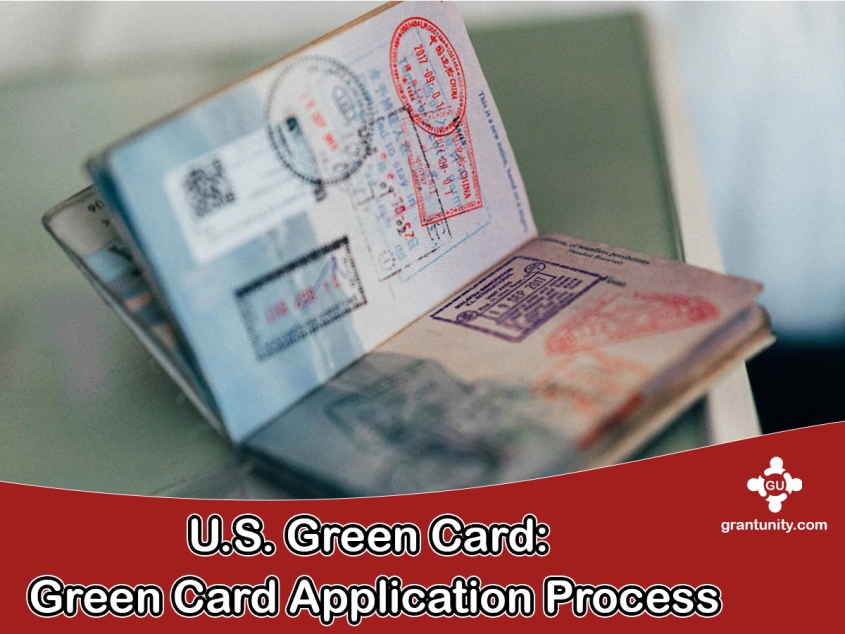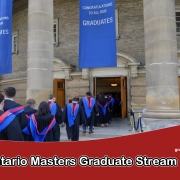U.S. Green Card: Guide to the Green Card Application Process
A green card, also known as a permanent resident card, is a permanent renewable visa for the USA. With a green card, you can live and work legally in the United States as a permanent resident. After a few years of residing in the country with a green card, you can apply for U.S. citizenship. The resources we’ve provided below will help you start your green card application process.


What Is A Green Card?
A Green Card, also known as a Permanent Resident Card, is a permanent renewable visa for the USA. With a green card, you can live and work legally in the United States as a permanent resident. After a few years of residing in the country with a green card, you can apply for U.S. citizenship. Your current citizenship status is unaffected by receiving a green card. A green card is typically granted for ten years but can be extended by submitting a renewal application.
What are the benefits of being a Green Card holder?
With permanent resident status granted by a green card, you can:
- Reside in the U.S.
- Buy your own house or property in the U.S.
- Travel between the U.S. and your country of origin without a visitor/business visa
- Seek employment and work in the U.S. without any other visa or work authorization
- Register your own company and run your own business in the U.S.
- Study in the U.S.
- Sponsor family members for U.S. immigrant visas
- Apply for U.S. citizenship after 5 years of residing in the U.S.

How To Get A US Green Card
The U.S. issues a set number of green cards each year in various categories. One may apply under one of these specific categories to obtain a green card, which will grant the beneficiary permanent residency in the U.S., depending on their qualifications and eligibility.
Types Of Green Cards
You may apply for one of the following based on various eligibility requirements. The procedure and deadlines differ for each category:
Employment-based Green Cards: There are three different categories for green cards: EB1, EB2, and EB3. When a U.S. employer agrees to sponsor your green card, you can obtain a green card through your employer. It is a multi-step procedure that includes filing a complex application for a fee.
EB-1: Professors, researchers, Ph.D. holders, and other professionals with exceptional talent in the sciences, arts, education, business, or sports fall into this category. Additionally, it includes those employed as managers and executives on an international transfer basis in the US (Company transfer L1 holder)
EB-2: Employees with a special talent in the arts, sciences, or business, as well as professionals with advanced degrees, fall under this category (PG. degree holders).
EB-3: Professionals with a Bachelor’s or Graduate degree and other skilled workers are included in this. Discover more information regarding each of the employment-based green card categories:
- EB-1A Extraordinary Ability
- EB-1B Professors and Researchers
- EB-1C Executives and Managers
- EB-2B Exceptional Ability
- EB3 Skilled Workers, Professionals, and Other Workers
- EB4 Special Immigrants
Family-Based Green Card (including Marriage-Based Green Card)
If a family member who is a U.S. citizen sponsors you for a green card, you may be granted one. Only spouses, children, parents, and siblings qualify as close relatives for this requirement.
Sponsor Eligibility: American National
If a family member who is a U.S. citizen sponsors you for a green card, you may be granted one. Only spouses, children, parents, and siblings qualify as close relatives for this requirement.
Applicant Eligibility: Foreign National
You must satisfy the following requirements to be qualified for lawful permanent residence based on a family relationship:
You must have a relative who is either a citizen of the United States or a lawful permanent resident who is willing to sponsor you for lawful permanent residency by submitting Form I-130, Petition for Alien Relative, and who can provide proof of their status.
Your relative must prove that their income is 125 percent or more above the established poverty line for their family, which includes you and all other sponsored family members, to show that they can support you.
You can demonstrate that you won’t depend on the government for benefits and become a public charge.
Show that you are part of the relationship.
Investment-Based Green Card
The EB5 Green Card, also referred to as the Immigrant Investor Program, is a type of green card based on employment that enables foreign investors to obtain permanent residency in the U.S.
For the EB-5 investment visa, there are various steps, documentation needs, and eligibility requirements. An immigration lawyer may be helpful.
Green Card Lottery
The U.S. Government’s Diversity Immigrant Visa Program, also known as the Green Card Lottery, Diversity Visa Lottery, or DV Lottery, distributes 55,000 immigrant visas (green cards) to foreign nationals of underrepresented countries each year. People from nations with low rates of immigration to the United States can apply for immigrant visas through the green card lottery.
The State Department administers the USA green card lottery, open to anyone from a qualifying nation who satisfies the prerequisites for the diversity visa lottery. Each year, from October to November, a computer-generated system is used to select applicants for the DV lottery randomly.
Those who win the DV lottery will have the chance to apply for permanent residence (green card).
People may be allowed entry into the U.S. and long-term shelter if they fear persecution in their home country or are victims of human trafficking, abuse, or crime. They will be given a green card, which will need to be renewed occasionally if they are found to be eligible.
Difference Between U.S. Green Card and U.S. Citizenship
This article will be useful if you’re unclear about the various statuses of individuals with permanent visas to live and work in the United States. Here, we’ll examine the definitions and variations of:
- Lawful permanent residence (holding a green card or “LPR” status), and
- U.S. citizenship.
Let’s have a look.
LPR Status Is a Stepping Stone to Naturalized U.S. Citizenship
Lawful permanent residence is typically a prerequisite for someone who wants to immigrate to the United States. This entails qualifying for a green card under one of the categories listed, followed by a residence application.
For instance, individuals may be granted lawful permanent residence after being petitioned (or “sponsored”) by a spouse, member of their immediate family, or an employer, after winning the diversity visa lottery, or after initially entering the country under the protection of the refugee or asylum laws.
Even after receiving a green card, most residents must wait a while (typically five years) before moving forward and applying to become citizens of the United States through the “naturalization” process.
Who Can Jump Straight to U.S. Citizenship?
People can become citizens of the United States by being born there, being born abroad to parents who are citizens of the country, or by living in the country as a child while a parent naturalizes (as described in these articles on acquiring or deriving citizenship through parents).
All of these require some kind of prior parental connection to the United States.
Without that, basically, the only way to instantly become a citizen of the United States is to enlist in the military, as explained in U.S. Citizenship Rights for U.S. Military Personnel and Veterans.
Green Card Compared to U.S. Citizenship
The following table summarizes some of the differences between having a green card and being a citizen of the United States, with more information provided below:
| Question | Green card holders | U.S. citizens (by birth or naturalization) |
| Can they be deported from the U.S.? | Yes, if they commit a crime or espionage, fail to advise the U.S. government of a change of address, become public charges, or otherwise do something that matches a ground of deportability found in U.S. law. | No, not based on the grounds of deportability. However, naturalized U.S. citizenship can be revoked if they commit fraud when applying for it. And citizens can give up their status voluntarily. |
| Will they receive an identity document? | Yes, a green card, also called Form I-551. | Yes, such as a birth certificate, a consular record of birth abroad to a U.S. citizen parent, or a naturalization certificate. |
| Do they qualify for a U.S. passport? | No. They’ll need to travel and return using their home country’s passport plus their green card. | Yes, after applying for it, with a few exceptions. |
| Can they vote in U.S. elections? | No; doing so could make them deportable. | Yes. |
| Can they petition for family members to immigrate? | Yes, for spouses and unmarried children, and with limited visas available per year. | Yes, for parents, spouses, children (married or not), and siblings. Fewer annual limitations apply, so the timeline is usually faster for spouses and minor children. |
| Do they qualify for government benefits? | Yes, but on a more limited basis than U.S. citizens enjoy. | Yes, if they meet the basic eligibility criteria. |
Rights and Benefits of U.S. Lawful Permanent Residence
A green photo I.D. card is given to a person who is a lawful permanent resident. The document serves as proof that the holder is eligible to apply for certain immediate family members to be granted green cards and permanently live and work in the United States.
Green card holders, however, are limited in their ability compared to American citizens. Elections in the U.S. are not open to them. If they do, it might be viewed as a false claim to citizenship and result in their deportation.
Even though they are referred to as “permanent” residents, not every person with a green card has this status. LPRs, for instance, are not permitted to live permanently outside the United States or to leave the country at any time. If they do, their residency will be revoked, and their application to enter the country again will be denied.
Additionally, they risk losing their right to remain in the country if they fail to notify U.S. Citizenship and Immigration Services (USCIS) of an address change, break the law, engage in acts of terrorism or espionage, or meet one of the other criteria for deportation.
Additionally, green card holders may not always be eligible for the same government benefits and assistance as American citizens. Before receiving benefits under many federal programs, green card holders must wait five years.

Rights and Benefits of U.S. Citizenship
The highest status attainable under U.S. immigration law is U.S. citizenship. It denotes a legitimately inalienable right to reside in the U.S. The grounds for deportability that apply to green card holders do not apply to citizens. A former immigrant’s citizenship can only be revoked if they were fraudulent in their initial application for it.
In contrast to green card holders, U.S. citizens can petition for their parents (as immediate relatives), their married children, and their brothers and sisters (in the fourth preference category—it takes a while). They can also petition for a longer list of foreign national family members to join them in the U.S. than permanent residents.
Frequently Asked Questions: U.S. Green Card
The U.S. Citizenship and Immigration Services (USCIS) issues “green cards,” which serve as proof of legal permanent resident status and grant permission to live and work anywhere in the country. However, conditional green cards based on marriage or investment must be replaced after the first two years. The majority of green cards must be renewed every ten years.
The government organization regulating legal immigration to the United States is called U.S. Citizenship and Immigration Services (USCIS), a division of the Department of Homeland Security (DHS). Green cards, naturalization, work permits, travel authorizations, and other “immigration benefits” are primarily governed by USCIS.
A foreign national with a “green card,” also known as a lawful permanent resident, is qualified to live and work in any location within the United States, sponsor certain family members for their own green cards, and eventually apply for citizenship.
The U.S. government may reject a green card application for some reasons, including but not limited to errors on the necessary forms, missing documents, insufficient financial resources, or failure to establish eligibility.
Anyone with a valid work visa, such as an H-1B or L-1 visa, can typically continue to do so while applying for a U.S. green card. Otherwise, green card applicants must wait to begin employment in the U.S. until they have submitted Form I-765, the application for a work permit.
Depending on when the I-130 petition that initiates the green card process was initially filed, the Visa Bulletin, published each month by the U.S. Department of State, indicates which green card applications can advance. Congress set a limit on the number of green cards that may be issued annually in specific categories, which resulted in a number of backlogs, hence the need for the visa bulletin.
The majority of Americans who are citizens or hold green cards in the country are allowed by law to sponsor their spouses for permanent residence status, also referred to as a “green card.” The total cost, waiting period, and other aspects of the marriage green card application process vary depending on several variables.
Depending on where you currently reside, whether your new spouse has a green card or is a citizen, and whether you are applying for a marriage-based green card, the processing time can range from 10 to 38 months.
The documentation needed for a marriage green card can vary depending on the circumstances, but in general, the couple must present proof, such as a copy of their marriage license, proof that the marriage is genuine, and proof that the sponsoring spouse can support the spouse applying for a green card financially.
A K-1, or “fiancé visa,” is a short-term visa that is only available to fiancés of American citizens who are living abroad and who plan to wed within 90 days of entering the country. Whether they reside in the country or abroad, spouses of American citizens and holders of U.S. green cards are eligible for marriage green cards, which eventually granted permanent residency.
A green card can be obtained in various ways, and each method has a unique timetable. The marriage-based green card application procedure could take as little as 10 months or as long as 3 years, depending on the circumstances.
The K-1 fiancé visa is available to American citizens engaged to a foreign national and planning to wed within 90 days of arriving in the country.
Each type of green card application can cost a different amount overall. Government fees for marriage-based green cards are $1,760 for spouses who reside in the U.S. and $1,200 for spouses who do not, in addition to other expenses like the cost of the required medical exam.








Leave a Reply
Want to join the discussion?Feel free to contribute!